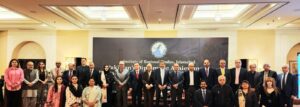
Ambassador Daniel M. Nganda, Charge d’Affaires of High Commission of Kenya in Islamabad, Pakistan
Speech at “Business Africa Trade Forum” hosted by Rawalpindi Chamber of Commerce RCCI on 02 Oct 2025 in the presence of Ambassador Hamid Asghar Khan, Additional Foreign Secretary at MOFA,Senator Mushahid Hussain Sayed, President of PAIDAR, Mr Usman Shaukat, President of the RCCI, Mr. Sohail Altaf, Group Leader RCCI
It is a profound honor to stand before you today during this 2025 African Business Forum hosted by your Chamber. Rawalpindi Chamber of Commerce and Industry, a hub of commerce and resilience that mirrors the entrepreneurial spirit of my own nation, Kenya. My name is Ambassador Daniel Mumina Nganda, Deputy Head of Mission at the Kenya High Commission in Islamabad. I represent the High Commissioner, who is on his annual leave.
I am deeply grateful for the invitation from the Rawalpindi Chamber of Commerce and Industry. Your chamber’s legacy of fostering trade and innovation is a testament to Pakistan’s unyielding drive for economic empowerment.
And in this graced gathering, surrounded by fellow diplomats and distinguished officials, we are not just convening as nations; we are renewing a bond forged in history, tempered by shared aspirations, and poised for exponential growth.

The historical ties between Kenya and Pakistan are profound, rooted in a longstanding cordial bilateral and diplomatic relationship stretching to Kenya’s pre-independence period. This shared legacy underpins our potential for enhanced economic and cultural cooperation. But our ties run deeper than diplomacy.
Consider the cultural threads: the enduring presence of Islam in both our lands, from the historic Swahili coast of East Africa to the bustling bazaars of Punjab. Pakistani traders once plied the Indian Ocean routes to Mombasa, exchanging spices, textiles, and ideas with Kenyan coastal communities.
Today, these historical relations bind us not as relics of the past, but as living foundations for friendship. We are nations that rose from the ashes of partition and liberation, united by a common creed: that sovereignty is the soil from which prosperity sprouts.
Now, let us draw parallels between our journeys of growth – for in these mirrors, we see not just similarities, but synergies waiting to be unlocked. Both Kenya and Pakistan are young democracies, navigating the exhilarating yet arduous stages of emerging economies.
We share a demographic dividend: youthful populations brimming with potential. In Kenya, over 75% of our 55 million people are under 35; in Pakistan, that figure nears 65% among your 240 million. This is our greatest asset – a workforce eager to innovate, but one that demands education, jobs, and opportunities.
Economically, we stand at kindred crossroads. Both our nations were agrarian powerhouses at independence: Kenya with its fertile Rift Valley soils yielding tea, coffee, and horticulture; Pakistan with its Indus Basin heartlands producing cotton, rice, and wheat.
Today, agriculture still anchors us – contributing 22% to Kenya’s GDP and 19% to Pakistan’s – yet we are both pivoting toward industrialization and digital frontiers. Kenya’s Vision 2030 echoes Pakistan’s Uraan Pakistan plan: both target 6% annual GDP growth by the late 2020s through export-led strategies.
We grapple with similar headwinds – climate variability battering our farms, inflation testing our resolve – but also seize parallel opportunities. Kenya’s Silicon Savannah in Nairobi is revolutionizing fintech and e-commerce, much like Pakistan’s burgeoning IT sector in Lahore and Karachi.
Our growth trajectories? Aligned: from lower-middle-income status, with Kenya’s GDP expanding at 5% annually and Pakistan rebounding to 2.6% this fiscal year, both fueled by resilient private consumption and foreign investment.

These parallels are no coincidence; they are invitations to collaborate. Just as Pakistan supported our independence, imagine the multiplier effect of joint ventures: Pakistani expertise in textiles enhancing Kenyan apparel exports, or Kenyan agribusiness models boosting Pakistan’s food security. We are at the same growth inflection point – transitioning from survival to scale – and together, we can accelerate.
This brings me to the beating heart of our relations today: a partnership pulsing with potential. Our bilateral trade has surged to nearly $1 billion annually – up from $752 million just two years ago – a testament to the vitality of our exchanges.
Pakistan’s rice graces Kenyan tables, valued at $256,953,000 in 2024, while Kenya’s world-renowned tea warms Pakistani homes. Beyond commodities, we are diversifying: pharmaceuticals, used clothing, and machinery flow both ways, with potential for many more. for even more.
The Pakistan-Kenya Joint Trade Committee, revived in recent years, is our engine room – discussing everything from tariff reductions to investment safeguards. And let’s not forget the human bridge: over 10,000 Pakistanis call Kenya home, from traders in Nairobi’s markets to students in our universities, while Kenyan professionals contribute to Pakistan’s vibrant diaspora.
Yet, esteemed friends, this is merely the prelude. As your Ambassador, I come not just to celebrate, but to market Kenya – Africa’s gateway, open for business with Pakistan’s ingenuity.
Picture this: Kenya as your launchpad to the 1.4 billion-strong African Continental Free Trade Area (AfCFTA), the world’s largest by participants. With our strategic port in Mombasa and the Standard Gauge Railway linking to Uganda and beyond, we offer seamless access to East and Central Africa.
Why invest now? Our economy is a mosaic of opportunity. In agriculture and agribusiness – a sector mirroring Pakistan’s – we seek partners for value addition: processing mangoes into global exports or dairy into halal-certified products.
Imagine joint cold-chain logistics, blending Pakistani engineering with Kenyan farms, to cut post-harvest losses by 30%. In manufacturing, our special economic zones offer tax incentives for textiles and leather goods, among others – perfect for Pakistani SMEs to scale regionally.
Then there’s the digital boom: Kenya’s M-Pesa revolutionized mobile money, handling $300 billion in transactions yearly. Pakistani fintech firms could co-develop solutions for our unbanked millions, tapping a $1 trillion African digital economy by 2030.
Tourism? Our safaris, beaches, and Mount Kilimanjaro await – a $2.5 billion sector ripe for Pakistani hospitality chains. And renewables: with 90% renewable energy potential, we’re building solar farms that could power Pakistan’s export processing zones too.
The Kenya Investment Authority streamlines it all: one-stop shops for permits, repatriation of profits, and work visas for your teams – all under a positive climate ranked among Africa’s best for ease of doing business. We have welcomed investors from over 100 nations; now, we extend that red carpet to Rawalpindi’s trailblazers. The Pakistan-Kenya Business Council stands ready to matchmake – from trade missions to joint ventures.
The private sector serves as the backbone of our economies, critical for harnessing the potential that exists in our trade relations. By creating jobs, providing essential goods and services, and generating tax revenue, the private sector can make a significant contribution to economic growth in both regions.
We advocate for enhanced business-to-business interactions and joint ventures to strengthen economic ties. Cultural exchange initiatives, such as food festivals, cultural exhibitions, and educational collaborations, are vital for enhancing people-to-people connections and fostering mutual understanding.
I urge Pakistani private sector leaders to capitalize on the burgeoning opportunities in Africa, primarily through strategic entry points such as Kenya. With numerous global corporations actively operating in Africa, it is paramount for Pakistani businesses to establish their presence in this dynamic market.
The potential for trade between Pakistan and Africa is substantial, and it is imperative that we work collaboratively to harness this potential. Through diversification of our cooperation and enhanced engagement with the private sector, we can unlock new pathways for economic growth and development, resulting in job creation and improved living standards.
I encourage African Heads of Missions and embassies based in Islamabad and business leaders to work collaboratively in pinpointing areas for partnership and developing actionable strategies to strengthen trade and investment ties. Establishing a regular dialogue platform would promote ongoing exchanges and mutual understanding between Pakistan and Africa.
With that, I wish you all fruitful discussions and productive engagements. Together, let us strive to forge a brighter future for both Pakistan and Africa.


